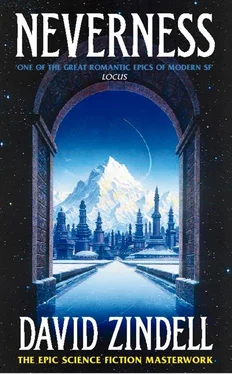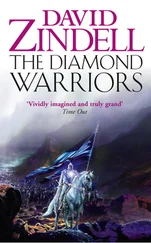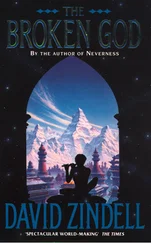I heard it ticking. All around us, in the Timekeeper’s circular Tower, were clocks ticking. Interspersed with the curved panes of glass around the circumference of the room, from the fur-covered floor to the white plaster ceiling, were wooden shelves upon which sat the clocks. Clocks of every conceivable design. There were archaic weight-driven clocks and spring clocks encased in plastic; there were wood-covered pendulum clocks, electric clocks and quartz crystal clocks; there were bio-clocks powered by the disembodied heart muscles of various organisms; there were quantum clocks and hourglasses filled with cobalt and vermilion sands; I saw three water clocks and even a Fravashi driftglass, which measured the time since the drifting super-galactic clusters had erupted from the primeval singularity. As far as I could determine, no two of the clocks told the same time. On top of the highest shelf was the Seal of our Order. It was a small glass and steel atomic clock which had been set on Old Earth the day the Order was founded. (The largest clock, of course, was – is – the Tower itself. Far below, set into the circle of ice surrounding it, twenty rows of granite radiate outward and mark the passing of the sun’s shadow. This giant sundial, inaccurate though it may be, is theoretically the only clock in the city by which we citizens can direct our activities. The Timekeeper abhorred the tyranny of time, and so he long ago ordered all clocks banned. This prohibition has proved a boon to the wormrunners who make fortunes smuggling in Yarkona pocket watches and other contraband.)
A clock gonged, and he gripped his forearms, one in either hand. He said, ‘I’ve heard that Soli has dissolved your oath.’
‘That’s true, Timekeeper. And I wish to apologize for my mother. She had no right to come to you, asking you to talk to Soli on my behalf.’
With his foot he pushed back the chair as he kneaded the tight muscles of his forearms. ‘So, you think I ordered Soli to release you from your oath?’
‘Didn’t you?’
‘No.’
‘My mother seems to think –’
‘Your mother – forgive me, Pilot – your mother often thinks wrongly. I’ve known you all your life. Do you think I’m stupid enough to believe you’d desert the Order to become a merchant pilot? Ha!’
‘Then you didn’t speak to Soli?’
‘You question me?’
‘Excuse me, Timekeeper.’ I was confused. Why else would Soli have released me from my oath, unless it was to shame me before all my friends and masters of the Academy?
I confided my doubts to the Timekeeper who said, ‘Soli has lived three long lifetimes; don’t try to understand him.’
‘It seems there are many things I don’t understand.’
‘You’re modest today.’
‘Why did you send for me?’
‘Don’t question me, damn you! I’ve only so much patience, even for you.’
I sat mutely in the chair looking out the window at Borja’s beautiful main spire, the one the Tycho had built a thousand years ago. The Timekeeper circled around to my side so that he could look upon my face as I stared straight ahead. It was the traditional position of politeness between master and novice that I had been taught when I first entered the Academy. The Timekeeper could search my face for truth or lies (or any other emotion) while preserving the sanctity of his own thoughts and feelings.
‘Everyone knows you intend to keep your oath,’ he said.
‘Yes, Lord Horologe.’
‘It seems that Soli has tricked you.’
‘Yes, Lord Horologe.’
‘And your mother has failed you.’
‘Perhaps, Lord Horologe.’
‘Then you’ll still try to penetrate the Entity?’
‘I’ll leave tomorrow, Lord Horologe.’
‘Your ship is ready?’
‘Yes, Lord Horologe.’
‘“To die among the stars is the most glorious death,” is it not?’
‘Yes, Lord Horologe.’
There was a blur from my side and the Timekeeper slapped my face. ‘Nonsense!’ he roared. ‘I won’t listen to such nonsense from you!’
He walked over to the window and rapped the glass pane with his knuckles. ‘Cities such as Neverness are glorious,’ he said. ‘And the ocean at sunset, or deep winter’s firefalls – these things are glorious. Death is death; death is horror. There’s no glory when the time runs out and the ticking stops, do you hear me? There’s only blackness and the hell of everlasting nothingness. Don’t be too quick to die, do you hear me, Mallory?’
‘Yes, Lord Horologe.’
‘Good!’ He crossed the room and opened a cabinet supporting a jar of pulsing, glowing red fluid. (I had always presumed that this evil-looking display was a clock of some sort, but I had never had the courage to ask him exactly what sort.) From the cabinet’s dark interior – the wood was a rare ebony and so dully black that it shed little light – he removed an object that appeared to be an old, leather-covered box. I soon saw that it was not; when he opened the ‘box,’ that is to say, when he turned back one section of the stiffened pieces of the brown, cracked leather, there were many, many sheets of what seemed to be paper cleverly fastened to the middle section. He came closer to me; I smelled mildew and dust and centuries-old paper. As his fingers turned the yellow sheets he would occasionally let out a sigh or exclaim, ‘Here it is, in ancient Anglish, no less!’ Or, ‘Ah, such music, no one does this now, it’s a dead art. Look at this, Mallory!’ I looked at the sheets of paper covered line after line with squiggly black characters, all of which were alien to me. I knew that I was looking at one of those archaic artifacts in which words are represented symbolically (and redundantly) by physical ideoplasts. The ancients had called the ideoplasts ‘letters,’ but I could not remember what the letter-covered artifact itself was called.
‘It’s a book !’ the Timekeeper said. ‘A treasure – these are the greatest poems ever dreamed by the minds of human beings. Listen to this … ,’ and he translated from the dead language he called Franche as he recited a poem entitled ‘The Clock.’ I did not like it very much; it was a poem full of dark, shuddering images and hopelessness and dread.
‘How is it that you can interpret these symbols into words?’ I asked.
‘The art is called “reading,”’ he said, ‘It’s an art I learned long ago.’
I was confused for a moment because I had always used the word ‘read’ in a different, broader context. One ‘reads’ the weather patterns from the drifting clouds or ‘reads’ a person’s habits and programs according to the mannerisms of his face. Then I remembered certain professionals practised the art of reading, as did the citizens of many of the more backward worlds. I had even once seen books in a museum on Solsken. I supposed that one could read words as well as say them. But how inefficient it all seemed! I pitied the ancients who did not know how to encode information into ideoplasts and directly superscribe the various sense and cognitive centres of the brain. As Bardo would say, how barbaric!
The Timekeeper made a fist and said, ‘I want you to learn the art of reading so you can read this book.’
‘Read the book?’
‘Yes,’ he said as he snapped the cover shut and handed it to me. ‘You heard what I said.’
‘But why, Timekeeper, I don’t understand. To read with the eyes; it’s so … clumsy. ’
‘You’ll learn to read, and you’ll learn the dead languages in this book.’
‘Why?’
‘So that you’ll hear these poems in your heart.’
‘Why?’
‘Question me again, damn you, and I’ll forbid you to journey for seven years! Then you’ll learn patience!’
‘Forgive me, Timekeeper.’
Читать дальше










